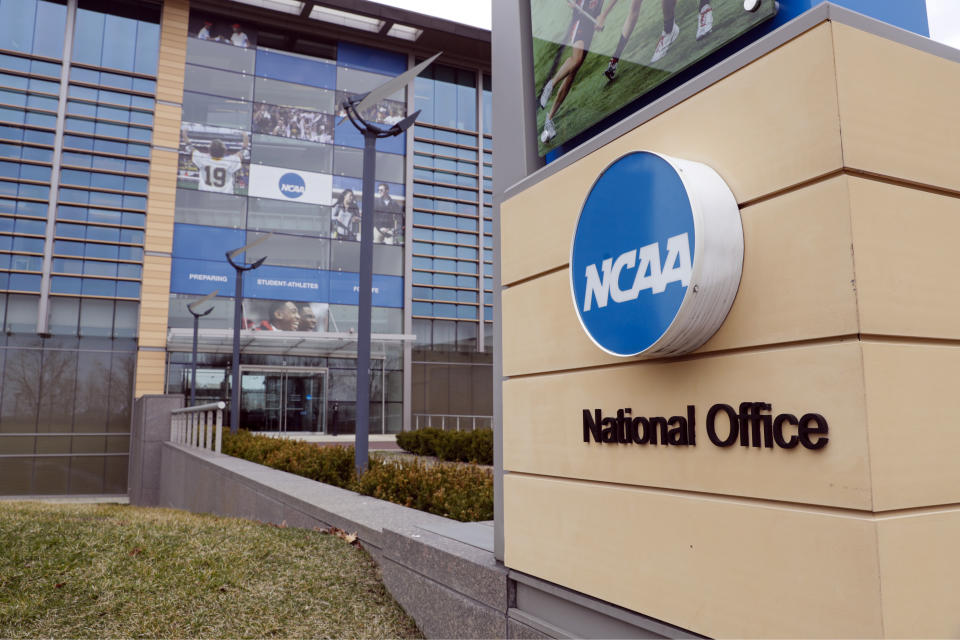Power 5 commissioners write letter to Congress urging federal law governing college athlete endorsements
The commissioners of the five biggest conferences in college athletics have written Congress a letter asking for a federal law to regulate how college athletes can get endorsement money.
The letter, obtained and made public by Stadium on Friday, continues the push from college athletics administrators for federal help in modernizing the NCAA’s antiquated amateurism rules. As states have started passing their own laws allowing college athletes to make money off their names and images, NCAA schools want a broad federal law to supersede individual state laws with varying specifics.
“We ask Congress to act so there will be a uniform national standard that will preempt state NIL laws, appropriately protect student-athletes and provide clear rules governing NIL licensing,” the letter signed by ACC commissioner John Swofford, Big Ten commissioner Kevin Warren, Big 12 commissioner Bob Bowlsby, Pac-12 commissioner Larry Scott and SEC commissioner Greg Sankey said.
“We have included as an addendum to this letter the 5 consensus principles on NIL. Several principles are foundation, such as continuing the emphasis on academics and having college athletes remain students, not employees. Other principles are more specific, which Congress alone has the power to provide. Without those important principles, the future of college athletics becomes uncertain.”
The recommendations made public by the NCAA on April 29 regarding changes to its current rules prohibiting athletes from making endorsement or sponsor income made it clear the governing body was looking for federal help in defining how it will implement the sweeping changes by the 2021-22 academic year.
The letter from the commissioners of five of the 10 FBS football conferences outlines what they want to see from Congress and is independent of any congressional urging by the NCAA.
“As the leaders of the [autonomous 5] conferences, we believe strongly that Congress should enact the framework for a clear national policy on NIL as soon as possible and not wait for the NCAA process to conclude before moving forward with a national legislative plan. We intend to work with the NCAA to help shape those rules, but the Congressional process should move forward in the meantime. In the absence of federal NIL legislation, we expect most if not all states to pass their own disparate NIL laws in early 2021 to take effect in the summer of 2021 if not sooner. So time is of the essence.”
Yes, the letter does include the phrase “time is of the essence.” States started creating their own laws allowing athletes to get endorsements because NCAA schools had moved so slowly on the issue of name, image, and likeness.
Remember, Ed O’Bannon filed his NIL suit against the NCAA and its licensing company in 2009. And yet here we are more than 10 years later with recommendations as the NCAA’s only steps towards letting players have their image rights.

‘Term of academic progress’ to get endorsement income
The letter makes multiple references to schools’ desires to keep athletes classified as students and not as employees. That distinction has been a bedrock of the NCAA’s amateurism model as football and basketball players have brought in millions of revenue for their schools yet haven’t been able to be compensated beyond their scholarships and, recently, cost-of-attendance stipends.
To keep that distinction, the commissioners want it clear that schools cannot pay their own athletes and that athletes can only make money from third parties. There’s also a request to Congress that wasn’t in the NCAA’s April recommendations.
“First, universities must be prohibited from paying NIL compensation to student-athletes. Second, university boosters must be kept out of the recruiting process, and this will be best achieved by prohibiting boosters from engaging in NIL activity with student-athletes that amounts to pay for play, as well as requiring a term of academic progress before a student athlete can grant an NIL license.
The phrase “term of academic progress” was not included in the 31 pages of NCAA recommendations and could have significant ramifications for freshmen football and basketball players who don’t enroll early at their schools.
If a freshman basketball or football player’s first academic term is the fall semester, that athlete won’t be able to get endorsement income until that semester is complete. That means a highly touted basketball player will have to wait until midseason to sign a shoe deal rather than sign a shoe deal ahead of the season. And a football player’s first season would basically be over before an endorsement deal could be signed. That could limit a star player’s college earning potential to just two years if he declares for the NFL draft after his third season.
NCAA made recommendations after rise of social media
The NCAA said in April that it was making its recommendations to NIL changes because of the way social media has changed the income landscape for college athletes. The NCAA’s working group making the recommendations said it realized how disparate the rules were for regular students and athletes and saw that a change was necessary.
“The rise of social media and other digital distribution and monetization platforms has dramatically increased the opportunities for college students to make commercial use of their NIL,” the recommendations said.
“Current divisional rules on this subject were drafted long before most of these opportunities existed, and those rules can prevent student-athletes from engaging in NIL-related activities that their non-athlete peers on campus frequently pursue. Consistent with the Board's direction that student-athletes should be treated the same as students in general, unless a compelling reason to differentiate exists, the working group concluded that divisional rules on student-athlete NIL should be modernized to account for this new media and promotional landscape.”
While the NCAA — and Congress — has a lot of specifics to work out regarding name, image, and likeness rules, the NCAA has said it wants to vote on the changes to its amateurism rules in January.
– – – – – – –
Nick Bromberg is a writer for Yahoo Sports.
More from Yahoo Sports:

